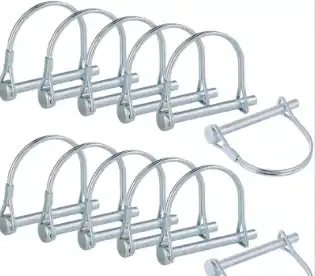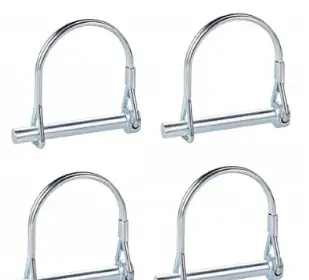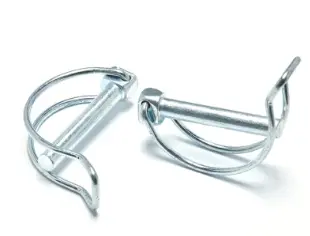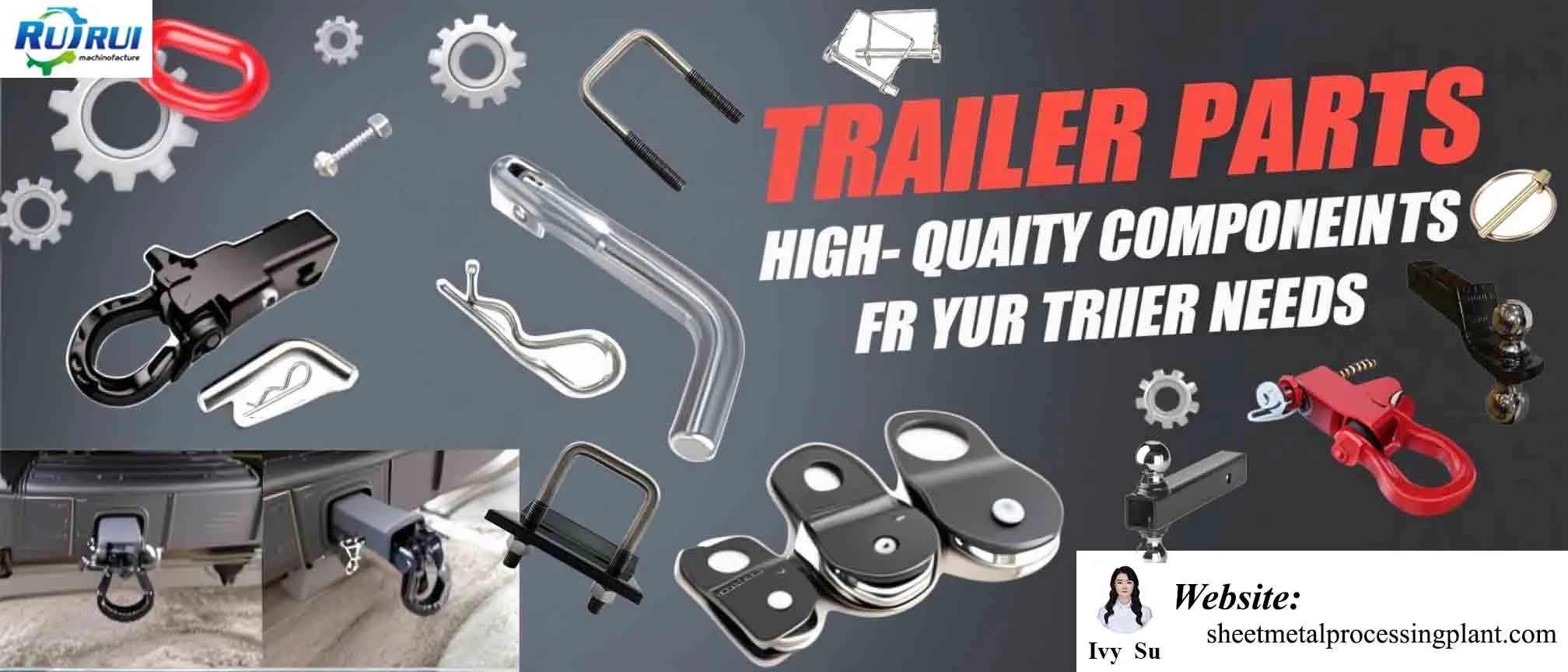Upgrade Your Trailer Safety with a Heavy-Duty Lockable Hitch Pin
2025-10-28 13:57:59
Picture this: you're driving down the highway with your trailer loaded with valuable equipment, and suddenly you feel a jolt. Your trailer has disconnected because a standard hitch pin failed under stress. This nightmare scenario happens more often than you think, costing businesses thousands in damages and creating serious safety hazards on the road. A heavy-duty Lockable Hitch Pin is your first line of defense against trailer theft and accidental disconnection, providing the security and peace of mind you need when transporting valuable cargo or equipment across any terrain.

Why Standard Hitch Pins Fail Your Safety Requirements?
Traditional hitch pins seem adequate until you encounter real-world challenges. Many fleet managers and commercial operators discover too late that basic pins lack the structural integrity needed for demanding applications. The receiver trailer hitch pin you choose directly impacts your operational safety and liability exposure. Standard pins often suffer from corrosion after minimal exposure to road salt and moisture, compromising their load-bearing capacity within months of installation. When hauling construction equipment or agricultural machinery, vibration and road stress constantly work against conventional fastening systems. A basic hitch pin without proper locking mechanisms can gradually loosen during transport, creating dangerous situations where trailers separate from towing vehicles unexpectedly. This presents not only equipment damage risks but also potential catastrophic accidents affecting other road users.
-
The Hidden Costs of Inadequate Hitch Security
Beyond immediate safety concerns, inadequate hitch security creates substantial financial burdens for commercial operations. Insurance claims from trailer theft or equipment loss due to connection failures can dramatically increase premium costs. Additionally, downtime caused by security incidents disrupts project schedules and damages client relationships. Many businesses fail to calculate the true cost of using inferior hitch pins until they experience a preventable loss. The receiver trailer hitch pin market offers numerous options, but selecting products based solely on initial purchase price proves shortsighted. High-quality lockable hitch pins represent an investment in operational continuity rather than merely another maintenance expense. Companies that prioritize security from the outset consistently report fewer incidents and lower total ownership costs over time.
Essential Features of Professional-Grade Lockable Hitch Pins
Professional operations demand hitch pins engineered to withstand extreme conditions while maintaining reliable security. High-grade steel construction with rust-resistant coatings ensures longevity even in harsh marine or industrial environments. The locking mechanism represents the critical component distinguishing premium lockable hitch pins from basic alternatives. Spring-loaded ball detent systems provide immediate visual confirmation of proper engagement while preventing accidental release during operation. Weight capacity specifications must align with your actual hauling requirements, not just minimum legal standards. Many operators make the mistake of selecting hitch pins rated exactly to their trailer's gross weight, leaving no safety margin for dynamic loading conditions. Professional-grade receiver trailer hitch pins typically offer capacity ratings up to 30,000 pounds, providing substantial safety margins for demanding commercial applications.
-
Material Selection and Corrosion Resistance
The manufacturing process significantly influences long-term performance and reliability. Premium lockable hitch pins utilize high-grade steel alloys specifically formulated for superior tensile strength and fatigue resistance. Surface treatments including electroplating and powder coating create multi-layer protection against corrosion, extending service life even in coastal regions where salt exposure accelerates deterioration of inferior products. Dimensional precision matters more than many operators realize. Hitch pins manufactured to tight tolerances ensure proper fit within receiver tubes, minimizing play that can cause wear and eventual failure. Standard sizes including 5/8-inch and 1/2-inch diameters accommodate most common applications, while length options ranging from 3 to 5 inches provide compatibility across diverse trailer configurations and receiver designs.

Applications Across Industries and Fleet Types
Commercial fleet vehicles represent the primary market for professional-grade lockable hitch pins, but applications extend across numerous sectors. Construction companies transporting heavy equipment between job sites require absolute reliability in their towing connections. Equipment trailers carrying excavators, bulldozers, and other machinery cannot afford connection failures that could damage expensive assets or create worksite hazards. Agricultural operations face unique challenges with seasonal demands and extended exposure to dust, moisture, and chemical fertilizers. A robust receiver trailer hitch pin designed for agricultural applications must resist corrosion from these harsh conditions while maintaining security during transport across rough terrain. Farming operations often involve remote locations where equipment failure creates significant recovery challenges and productivity losses.
-
Recreational and Military Applications
Recreational vehicle owners and boat towers require the same level of security as commercial operators, though their usage patterns differ significantly. Weekend travelers need confidence that their trailers remain securely attached during highway travel and protected from theft when parked at campsites or marinas. High-quality lockable hitch pins serve dual purposes: operational safety during towing and theft deterrence when vehicles are unattended. Military and government transport vehicles operate under demanding conditions requiring equipment that meets rigorous specifications and reliability standards. Defense logistics depend on secure trailer connections for moving supplies, equipment, and support vehicles across challenging terrain. The hitch pin securing these critical connections must perform flawlessly regardless of environmental conditions or operational stress levels encountered during deployment or training exercises.
Installation Best Practices and Maintenance Requirements
Proper installation begins with selecting the correct hitch pin diameter and length for your specific receiver tube configuration. The receiver trailer hitch pin should slide smoothly through the receiver holes without excessive force, but fit snugly enough to prevent lateral movement. Before installing a new lockable hitch pin, inspect the receiver tube for debris, corrosion, or damage that could interfere with proper engagement or compromise security. The locking mechanism requires attention during installation to ensure proper function. Spring-loaded ball detent systems should click audibly into place, providing tactile and visual confirmation of secure engagement. Test the locking action several times before loading your trailer to verify smooth operation and proper alignment. Some advanced lockable hitch pins incorporate key-operated locks requiring additional steps during installation, but offering enhanced security against theft.
-
Routine Inspection and Preventive Maintenance
Regular inspection intervals prevent unexpected failures and extend the service life of your hitch pins. Before each towing operation, visually inspect the lockable hitch pin for signs of wear, corrosion, or damage. Pay particular attention to the locking mechanism, ensuring it engages fully and operates smoothly without sticking or binding. Any hesitation or difficulty in operation warrants immediate replacement rather than risking failure during transit. Cleaning and lubrication maintain optimal performance, especially for equipment exposed to harsh environments. Remove accumulated dirt, salt, and debris using appropriate cleaning solutions that won't damage protective coatings. Apply light lubrication to moving parts within the locking mechanism, avoiding excessive oil that attracts contaminants. For operations in marine environments or areas with heavy winter road salt use, increase inspection frequency to detect early signs of corrosion before they compromise structural integrity.

Selecting the Right Supplier for Your Fleet Needs
Sourcing decisions impact not just initial product quality but long-term support and reliability throughout your equipment's service life. Established manufacturers with proven track records in trailer accessories bring valuable experience to product design and quality control. Companies specializing in metal fabrication and precision manufacturing possess the technical capabilities necessary to produce consistently reliable hitch pins meeting demanding specifications. Manufacturing certifications provide objective evidence of quality management systems and production capabilities. ISO 9001 certification demonstrates commitment to systematic quality control, while additional certifications like ISO 14001 for environmental management and OHSAS 18001 for occupational safety indicate comprehensive operational excellence. These certifications aren't merely paperwork exercises but reflect substantial investments in processes that directly benefit product quality and consistency.
-
Customization Capabilities and Technical Support
Fleet operations with unique requirements benefit from suppliers offering customization services beyond standard catalog products. The ability to specify special dimensions, higher weight capacities, or unique locking mechanisms enables optimal solutions for unconventional trailer designs or specialized applications. Experienced manufacturers maintain engineering teams capable of collaborating on custom designs that address specific operational challenges while maintaining structural integrity and safety margins. Technical support throughout the product lifecycle distinguishes exceptional suppliers from mere parts vendors. Pre-purchase consultation helps identify the most appropriate receiver trailer hitch pin specifications for your application, avoiding costly mistakes from selecting inadequate or incompatible products. Post-purchase support including installation guidance, troubleshooting assistance, and warranty service ensures your investment delivers expected performance throughout its intended service life.

Conclusion
Upgrading to a heavy-duty lockable hitch pin transforms trailer security from a vulnerability into a competitive advantage. Professional-grade products combining superior materials, precise manufacturing, and proven locking mechanisms deliver reliability that protects valuable assets and prevents operational disruptions.
Cooperate with Qingdao RUIRUI Machinary Co., LTD.
As a leading China Lockable Hitch Pin manufacturer, China Lockable Hitch Pin supplier, and China Lockable Hitch Pin factory, Qingdao RUIRUI Machinary Co., LTD. offers High Quality Lockable Hitch Pin solutions with competitive Lockable Hitch Pin price for China Lockable Hitch Pin wholesale and Lockable Hitch Pin for sale. Since 2016, we've specialized in trailer pins, winches, and custom metal fabrication with ISO 9001, ISO 14001, and OHSAS 18001 certifications. Our eight production lines deliver 130,000 pieces annually using advanced CNC machining, laser cutting, powder coating, and electroplating processes. With materials including high-grade steel, stainless steel, and aluminum alloys, we provide customized solutions meeting your exact specifications. Our R&D team ensures short delivery times, professional OEM support, and comprehensive after-sales service. Contact us at info@qdkshd.com to discuss your receiver trailer hitch pin requirements and experience why over 80 countries trust RUIRUI for their trailer accessory needs.
References
1. "Trailer Hitch Safety Standards and Best Practices," Society of Automotive Engineers (SAE), Technical Standards Committee on Towing Systems
2. "Heavy-Duty Vehicle Towing Equipment: Design, Testing, and Performance Requirements," American National Standards Institute (ANSI), Transportation Equipment Division
3. "Corrosion Protection for Automotive Towing Components," National Association of Corrosion Engineers (NACE), Materials Performance Standards Working Group
4. "Commercial Fleet Safety Management: Trailer Connection Systems," Commercial Vehicle Safety Alliance (CVSA), Equipment and Maintenance Committee
Send Inquiry
You may like
